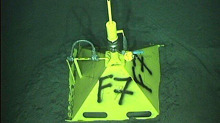Charges filed against Chevron, Transocean in Brazil
 Federal prosecutors in Brazil filed criminal charges against 17 oil company executives on Wednesday for an oil leak in the Atlantic, legal action that has prompted debate about whether it could slow Brazil’s effort to develop its massive offshore finds.
Federal prosecutors in Brazil filed criminal charges against 17 oil company executives on Wednesday for an oil leak in the Atlantic, legal action that has prompted debate about whether it could slow Brazil’s effort to develop its massive offshore finds.At least 110,000 gallons (416,000 litres) of oil seeped through cracks on the ocean floor near a Chevron Corp. appraisal well off the Rio de Janeiro coast in November. The well drilled by Transocean Ltd. has since been sealed, but a small amount of seepage reappeared in recent days, raising concern the damage is not yet over.
The federal prosecutors’ office in Rio de Janeiro said in an e-mailed statement that the two companies and 17 of its executives have been charged with “crimes against the environment.” It did not detail the exact charges, but said that, if found guilty, the defendants could face as much as 31 years in prison.
A judge will now decide whether the executives will face trial, which would be a lengthy process given the number of defendants, the complexity of the case and the Brazilian legal system’s room for numerous appeals.
Those named by prosecutors in preliminary documents include six Americans, five Brazilians, two French and Australian nationals, one British citizen and one Canadian. They include the heads of the Brazilian subsidiaries of both Chevron and Transocean.
A judge ruled late last week that none of the executives could leave Brazil.
Prosecutors have also asked that that all the assets of those charged be seized, that each person be fined $555,555 (U.S.) and each company $5.6-million.
Brazil has seen much worse oil spills, but the Chevron leak is the biggest test of offshore drilling safety since massive deposits were discovered in recent years, reserves that could hold 50 billion barrels of oil.
Brazilian officials are counting on their country being one of the globe’s top oil-producing nations before the decade is out, and politicians are debating how to divide the future royalties.
But Eric Smith, an offshore oil expert at Tulane University in New Orleans, said legal charges could spook other big foreign companies, risking delays in developing those finds.
“If you start locking up executives, people back in other oil companies like Shell, BP, ENI and anyone else with a concession in Brazil will notice and become wary,” Smith said.
With such a big potential payoff, “foreign oil companies won’t abandon Brazil completely, but they could retract, withdraw their assets and wait for better times, like they’re doing in Venezuela,” he added.
Gustavo Gattass, a Rio de Janeiro-based analyst at Brazilian investment bank BTG Pactual, disagreed.
“This strong stance by Brazilian prosecutors might rattle small companies, they may become more reluctant. But the exploration of oil is for big businesses, especially in Brazil’s offshore areas,” he said. “I don’t see any evidence to support the idea this will diminish investment.”
At the time of the leak, Chevron said it had underestimated the pressure in an underwater reservoir, so that crude rushed up a bore hole and eventually escaped into the surrounding seabed some 370 kilometres off Rio’s coast.
The oil escaped through at least seven narrow fissures on the ocean floor, all within 50 metres of the well head.
“Everything indicates that Chevron was imprudent and that area should not have been developed,” Carlos Minc, the Environment Minister for Rio de Janeiro state, told foreign correspondents in Rio. “The porous seabed has dozens of fissures and faults through which oil seeps.”
Mr. Minc stressed that the geographic studies of the area of the appraisal well required extreme caution and extra safety measures.
Asked whether the government was overreacting because Chevron is a foreign company, Mr. Minc said: “I don’t think it [the reaction] was excessively rigorous.”
He said Brazil’s state-run oil giant Petrobras has also been fined for leaks.
“I do not see any ‘Chavismo’ here,” he said referring to Venezuelan President Hugo Chavez’s contentious relationship with foreign oil companies.
In a speech delivered Wednesday, Brazilian President Dilma Rousseff said foreign oil companies operating in Brazil must “abide by the safety regulations and know they must stay within security limits and sometimes below security limits but never go beyond them.”
Ms. Rousseff spoke at the inauguration of Magda Chambriard as president of Brazil’s National Petroleum Agency. She did not mention either Chevron or Transocean.
Last week, Chevron confirmed a “small new oil seepage” in the Frade field. The size of the new leak isn’t known, and Brazil’s National Petroleum Agency said it was detected because an oil slick appeared on the ocean surface.
Prosecutor Eduardo Santos de Oliveira said in his preliminary legal papers that the two companies failed to adopt procedures to contain the leak. He wrote that those expected to face charges didn’t halt drilling operations soon enough and that, when questioned, they said the risks involved “were acceptable.”
Mr. Oliveira says Chevron and Transocean “altered the truth” in documents presented to authorities, such as the number of ships deployed to contain the leak.
“The reckless operation that led to the environmental damage was planned or approved by all [17 executives],” Mr. Oliveira said. “They knew they were drilling in a high-pressure area and that the walls of the well could not withstand that pressure.”
Chevron has denied any wrongdoing, but has said any legal decision would be abided by the company and its employees.
You can return to the main Market News page, or press the Back button on your browser.

